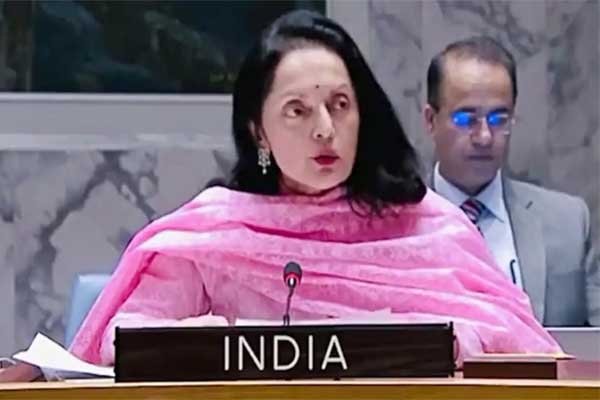India’s Permanent Representative to the United Nations, Ruchira Kamboj, emphatically denounced the loss of civilian lives in the ongoing conflict between Israel and Hamas, asserting that the resulting humanitarian crisis is unequivocally unacceptable. Addressing a meeting of the United Nations General Assembly (UNGA) to discuss the situation in West Asia, Kamboj highlighted India’s sustained efforts to normalize the region’s ongoing turmoil and extend humanitarian aid to Gaza.
“The ongoing conflict between Israel and Hamas has led to a large-scale loss of civilian lives, especially women and children, and has resulted in an alarming humanitarian crisis. This is clearly unacceptable, and we have strongly condemned the deaths of civilians. At the same time, we are aware that the immediate trigger was the terror attacks in Israel on October 7, which were shocking and deserve our unequivocal condemnation. India has a zero-tolerance approach to terrorism,” stated Kamboj.
India’s involvement in the resolution of the Israel-Hamas conflict has been proactive, with diplomatic efforts at various multilateral forums. Ruchira Kamboj emphasized that the Indian leadership maintains constant communication with leaders in the region, including those of Israel and Palestine. This dialogue extends to participation in multilateral forums such as the G20, the BRICS, and the Global South Summit in November 2023. India has consistently reiterated its principled stance on the Israel-Palestine issue, advocating for continued humanitarian aid for the affected population.
“In this regard, we hope that Security Council Resolution 2720 would aid in enhancing humanitarian assistance,” added India’s permanent envoy to the UN. She emphasized India’s commitment to providing humanitarian aid, revealing that the country has contributed 70 tonnes of humanitarian assistance, including 16.5 tonnes of medicine and medical supplies, to the people of Palestine. India also provided USD 5 million, including USD 2.5 million at the end of December 2023, to the United Nations Relief and Works Agency for Palestine refugees in the Near East, supporting core programs such as education, healthcare, relief, and social services for Palestinian refugees.
Reiterating the two-state solution, Kamboj stressed that a peaceful resolution of the conflict through dialogue and diplomacy remains the only viable path forward. She emphasized that India’s message throughout the conflict has been consistent—calling for the prevention of escalation, ensuring the continued delivery of humanitarian aid, and working toward an early restoration of peace and stability.
“The message that India has conveyed since the start of this conflict is clear and consistent. It is important to prevent escalation, ensure the continued delivery of humanitarian aid, and work towards an early restoration of peace and stability. A peaceful resolution of the conflict through dialogue and diplomacy is the only way forward,” Kamboj asserted.
By reaffirming India’s firm commitment to achieving a just, peaceful, and lasting solution to the Israel-Palestine issue, Kamboj reiterated that only a two-state solution, achieved through direct and meaningful negotiations between both sides on final status issues, will deliver an enduring peace that the people of Israel and Palestine desire and deserve.
In light of the alarming humanitarian crisis, Ruchira Kamboj urged the parties involved to de-escalate tensions, eschew violence, and collaborate to create conditions conducive to the early resumption of direct peace negotiations. The Indian envoy’s comprehensive statement at the UN reflects India’s active engagement in addressing global crises, advocating for peace, and promoting diplomatic solutions to complex geopolitical challenges.
